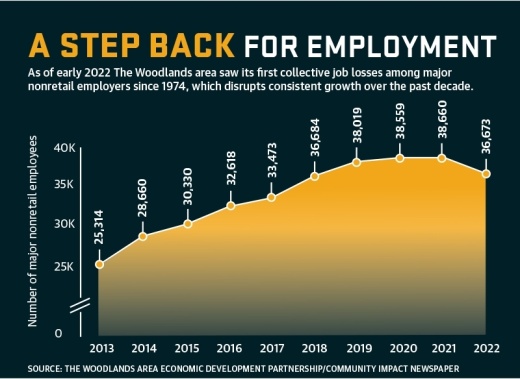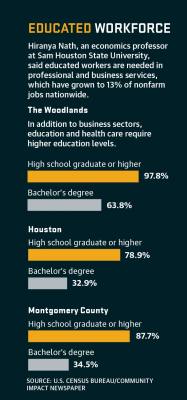The area saw a net loss of 1,987 major nonretail jobs in the last year, including 1,500 from ExxonMobil, according toThe Woodlands Area Economic Development Partnership, during The Woodlands Area Chamber of Commerce’s Annual Economic Outlook Conference on Feb. 11. The EDP presented its annual report of major nonretail employers, regional economic updates and total nonretail job counts at the conference.
“A major [energy] employer moved just south of our community,” Staley said in a phone interview, referring to ExxonMobil moving 1,500 employees to Spring in 2021. “That was a huge factor in seeing the downturn.”
Following a trend that began in 2019—when energy was the largest industry in the region for major nonretail employers, or those with 100-plus employees—the energy sector dropped from the area’s third-largest single sector to the fourth largest in the 2022 report, according to The Woodlands EDP. Over the three-year period, the sector has decreased from making up 27% of the jobs in the area to 8.1% among major nonretail employers.
Bill Gilmer, the director of the University of Houston’s Bauer Institute for Regional Forecasting, said despite rising oil prices—which often equate to employment opportunities in the oil and gas industry—he believes the Houston region will not see a return to the same strength the industry previously saw.
“I would not be optimistic about big job gains or it ever returning in the foreseeable future to 2014 levels in Houston,” Gilmer said.
Despite the job losses and declines in the energy sector, Staley said he is optimistic about other industries continuing to grow. According to the EDP’s 2022 report, the health care, education, and professional and business services make up the top three industries for employment in the area. “It is still a surprise to me in a very good way to see health care growing stronger and stronger, year after year,” Staley said. “That is unprecedented to us, and it is not going to slow down.”
Oil and gas struggles
According to Gilmer, the oil and gas industry has been hesitant to expand job offerings due to previous industry crashes and bankruptcies from oil prices being cut, and the recovery for the sector has been slow since the previous crash in 2014.
In late October, ExxonMobil announced it would relocate its employees from The Woodlands to its Houston campus based in City Place in Spring. As of the EDP’s report in February, ExxonMobil was no longer among The Woodlands area’s 84 major nonretail employers.
Gilmer stated this follows a trend of slow growth for the oil and gas industry as a whole between a credit crunch and oil prices dropping from the Organization of the Petroleum Exporting Countries in 2014 as well as the coronavirus pandemic beginning in 2020.
“We have lost 75,000 jobs [in the Houston metro], and most of those will simply never come back,” Gilmer said. “We will see some returns this year. ... We are seeing improved oil prices, anything above $65 [per barrel] is respectable, and their finances are substantially improved.”
NASDAQ data indicated as of March 10 that the average crude oil price was $106.02 per barrel. Gilmer noted the conflict between Russia and Ukraine that began Feb. 23 was also affecting oil prices as 40% of the natural gas that goes throughout Europe is exported from Russia.“It is not a growth stock anymore. Now it is a value stock,” Gilmer said. “That means the rig count cannot grow as fast as it did previously.”

Both Gilmer and Staley noted the increasing oil prices are not factoring into job growth for the region, which are affected by numerous conditions.
Gilmer said following a previous crash in 2014, the industry shifted to a new financial model, which involves paying dividends to investors instead of diverting revenue to job growth.
Hiranya Nath, an economics professor at Sam Houston State University, said the disruptions from the early shutdowns with the coronavirus pandemic in early 2020 caused the industry to focus on digital technology for efficiency and productivity gain, although this may have caused additional slow growth.
“There is a shortage of skilled workers who can facilitate adoption of appropriate technologies and extraction of value thereof,” Nath said.
Staley noted there has been some movement from midsize oil and gas employers that may make them major employers in future years. GeoSouthern Energy, an independent oil and gas company, was among the businesses that moved from a midsize employer in 2021 with 99 employees to a major employer with 136 in 2022.
Patrick Jankowski, senior vice president of the Greater Houston Partnership, said midsize employers are adding jobs for the Houston region as a whole but are struggling to fill openings.“The National Federation of Independent Business found that in January, 47% of its members had job openings they could not fill,” Jankowski said. “The number of unfilled job openings still far exceeds the 48-year historical average of 23%.”
Growing industry
Alongside the health care and education industries, the professional and business services sector saw a slight increase to become The Woodlands’ third-largest nonretail employer in 2021 with 4,217 of the 36,673 nonretail jobs among those employers in the region, according to the EDP’s report. The industry makes up 11.5% of the major nonretail jobs in the area, up from 4,203 jobs, or 10.9%, the previous year. It had previously decreased from comprising 16% of area jobs in 2019.Staley said the professional and business services industry consists of a variety of jobs, including engineering firms, communication firms and credit card transaction companies, which provide services to the market.

“They fit well with the assets that we have in The Woodlands,” Staley said. “They require office space, ... and we are perfectly suited for that. Most of them require highly educated employees, and we can meet that need.”
U.S. Census Bureau data from the 2015-19 Annual Community Survey five-year estimates shows, in The Woodlands, 98.7% of the population age 25 or older is a high school graduate, and at least 63.8% have a bachelor’s degree. This is higher than the city of Houston and Montgomery County where 78.9% and 87.7%, respectively, of residents are high school graduates and 32.9% and 34.5%, respectively, have a bachelor’s degree.
Jankowski said the professional, scientific and technical service industries were among the fastest growing across the Houston region in 2021.
“These tend to be white-collar jobs and well paid, which is good for Houston’s overall economy,” Jankowski said.Nath said he believes the business and professional services sector has bright prospects, both locally and nationally, as it makes up about 13% of nonfarm jobs across the United States in 2022 and is projected to grow throughout the 2020s.
“Given that The Woodlands is often identified as one of the best places to live in the U.S., it may attract more educated and skilled workers to the area, and that may also catalyze the growth of these services,” Nath said.
A statement from Alight Solutions, the largest professional and business services employer in The Woodlands area with 1,530 employees—up from 1,200 in 2021—stated the lingering effects of the pandemic have led to an increased demand for services. Alight Solutions helps companies with benefits, payroll and human resources, and the company built a new facility in The Woodlands in 2020 as part of its anticipated growth over the next decade.“We believe the need for these services will remain strong given the renewed importance placed on employee retention and recruitment,” the company said in a statement.
Expressing optimism for growth
Despite the reported losses, Staley said he remains optimistic due to the number of requests for proposal from companies looking to relocate to the area. As of Feb. 22, Staley said the EDP was speaking with four businesses, including those outside the state and country, that are looking to locate headquarters in the area.Staley said the EDP is targeting California for recruitment purposes, and it is in the process of working with two life sciences companies, but he could not disclose the companies’ names. In the 2022 EDP report, there are two life science companies in the major nonretail employers, which make up 0.6% of the total jobs: Rigaku Americas with 135 employees and MilliporeSigma with 103 employees.
Staley added the growth in health care jobs in the area has contributed to making The Woodlands a medical center for the region north of Houston with major expansions to two facilities due to be completed in June.
From 2021-22, the health care industry has collectively added 338 jobs to the area, growing from 10,806 to 11,144, or increasing from 28% to 30.4% of total jobs among major nonretail employers, according to the EDP.Among the top five employers for the area, hospitals Memorial Hermann The Woodlands Medical Center added two jobs; Houston Methodist The Woodlands Hospital added 203 jobs; and CHI St. Luke’s Health added 257 jobs.
However, EDP data shows other health care employers, such as Texas Children’s Hospital and McKesson Specialty Health, lost 40 and 391 jobs.
When the South Tower at Memorial Hermann The Woodlands Hospital and the Healing Tower at Houston Methodist The Woodlands Hospital expansions are completed by June, it is estimated 650 additional jobs will come with them, according to the hospitals. “I think we are already a true medical center for primary care,” Staley said. “It is addressing the population growth we have seen year after year.”






